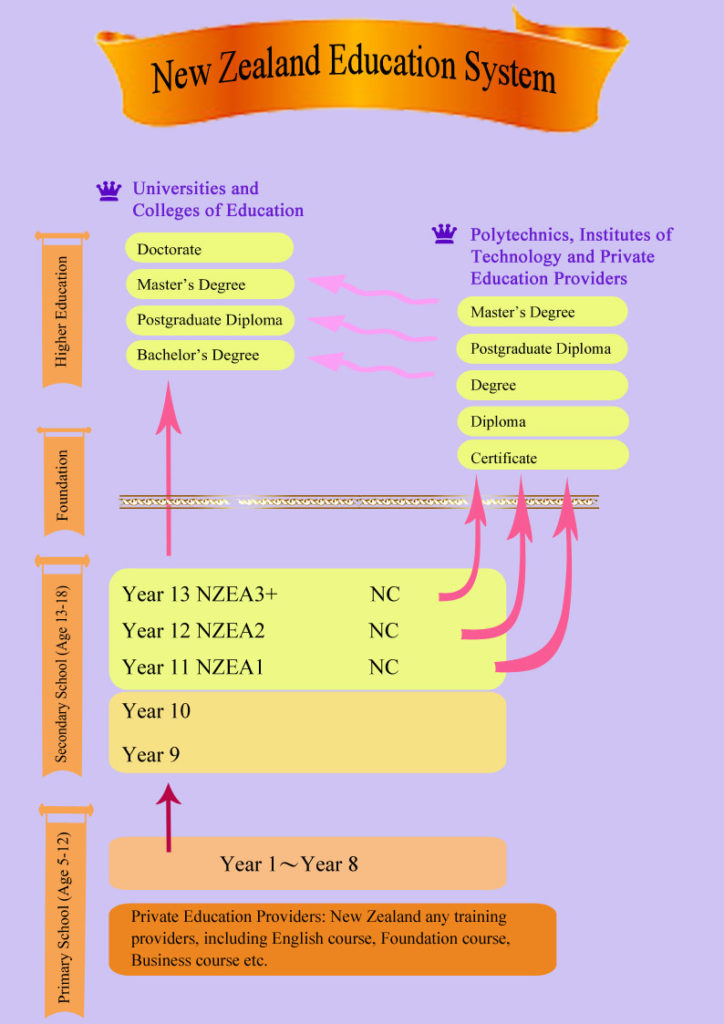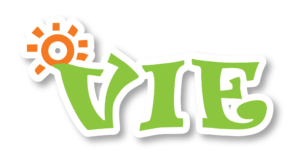Introduction of the New Zealand education system Education in New Zealand
New Zealand is heavily influenced by the United Kingdom due to their historical and political ties. Prior to 1947 New Zealand was a colony of the Britain empire and stands as a current member of the British common wealth. Because of this strong connection, the education system of New Zealand is adopted from the British education system.
The primary education in New Zealand consists of six year levels starting at the age of five. The precise timing of starting and finishing year 1 can vary among the students due to their differences in birthdays. Normally, the teacher decides when should a student move onto year two.
There are many options for schooling in New Zealand. Whether it be primary or secondary education, there are options for private school, state school, co-educational, single-sex and Catholic/Christian school.
The primary education covers 6 compulsory subjects (mathematics, science, social studies and English) and no selective subjects. The focus of education is to teach the students how to interact with the environment and other people; in other words, living is part of the education.
New Zealand’s education system respects the performance of each student and does not allow for any physical punishment. Furthermore, New Zealanders enjoys sports and encourages fitness training from childhood.
Growing up and studying in the peaceful atmosphere of New Zealand can teach the students more than just knowledge and skills, but also how to live their lives to the fullest.
Secondary Education
New Zealand’s secondary education is established upon the British system; it encourages students to think independently and prepares them for future studies or career.
The official secondary school qualification offered in New Zealand is NCEA (National Certificate in Educational Achievement), however, certain schools offer other secondary school qualifications like Cambridge International Exams and International Baccalaureate.
There are 8 universities in New Zealand which provides a number of undergraduate and postgraduate courses. These universities are research orientated but are still recognised internationally for their high teaching standard.
New Zealand has being recognised by the UNESCO to be among the top 10 developed countries in terms of education. According the International Guide To Qualification In Education, the entry requirement of New Zealand’s university rivals the GECA level of the British system. Therefore, the qualification and academic record received from New Zealand universities and institutes are internationally recognised.
There is flexibility for the start dates of language courses. Majority of the classes are small or one to one teaching that are beneficial for studying if you are going to sit either the IELTS or TOEFL tests.

Primary School
Secondary/High School
College/University

Balmoral School
Belmont Intermediate School
Birkdale Intermediate School
Bucklands Beach Primary School
Campbells Bay Primary School
Elm Park Primary School
Glendowie Primary School
Glenfield Intermediate School
Henderson Intermediate School
Mairangi Bay School
Mt Hobson Middle School
Murrays Bay Intermediate School
St Heliers School
Takapuna Normal Intermediate School
Tauranga Intermediate School
Te Puna School
Wairau Intermediate School
Whangaparaoa Primary School
Freemans Bay School
Willow Park School

Auckland Grammar School (AGS)
Avondale College
Birkenhead College
Botany College
Cambridge High School
Cromwell College
Edgewater College
Elim Christian College
Epsom Girls Grammar School
Glenfield College
Green Bay High School
Howick College
Kelston Girls’ College
Kingsway School
Kristin School
Liston College
Long Bay College
Lynfield College
Macleans College
Marist College
Massey High School
Middleton Grange International College
Mount Albert Grammar School
Mount Roskill Grammar School
Nelson College
New Zealand Career College
Northcote College
Onehunga High School
Pakuranga College
Papatoetoe High School
Rangitoto College
Rosehill College
Rosmini College
St Dominic’s College
Takapuna Grammar School
Tauranga Boys’ College
Tauranga Girl’s College
Taylors College
The Corelli School of the Arts
The Manurewa High School
Timaru Girls’ High School
Waitakere College
Western Springs College
Westlake Boys High School
Westlake Girls High School
William Colenso College
St Peter’s College
Marcellin College

AIS St Helens
Auckland University of Technology (AUT)
University of Auckland
University of Canterbury
University of Otago
Travel Careers and Training School
Auckland Edinburgh College
Computer Power Institute
Cornell Institute of Business & Technology
Dynaspeak English
Federal Institute of Studies
ICL Business School
International College of Auckalnd
International Travel College (ITC)
Le Cordon Bleu New Zealand Institute
Lincoln University
Massey University
Media Design School
Manukau Institute of Technology
National Technology Institute
New Zealand Asia Institute
New Zealand Management Academies (NZMA)
New Zealand College of Chinese Medicine
National Tertiary Education Consortium (NTEC)
New Zealand Institute of Education
Pacific International Hotel Management School
Victoria University of Wellington
Queenstown Resort College
Raffles College of Design and Commerce
Sheffield English Language School
The Campbell Institute
The University of Auckland – English Language Academy
The university of New England
The University of Waikato
Unique New Zealand
Te Wananga O Aotearoa
AMES IT Academy
New Zealand Tertiary College
Language Studies International (LSI)
Language International
International College of Homeopathy
Latest News
Language Learning, Education Counseling, Physical and Psychological Care, Cultural and Human Experience, are VIE five school of direction, each direction are equally important.

